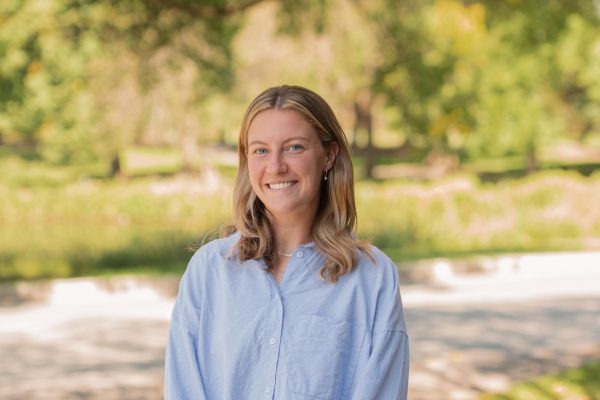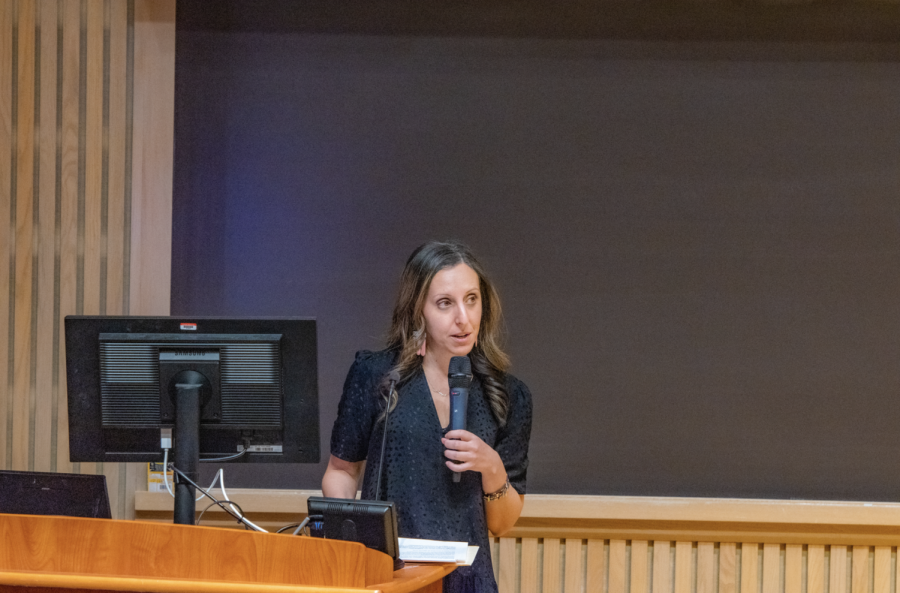Educational Studies Department Hosts Annual Race and Education Lecture
The university’s department of educational studies held the annual Race and Education lecture in Love Auditorium in Olin Hall this past Wednesday, March 23. “Teaching Love and Learning Freedom: Practicing Community in the Classroom” focused on classroom organization and how the system of punishment used in modern public schools mirrors the real-world criminal justice system. Topics from the lecture included trauma-informed practice, healing-centered engagement, transformative justice, critical pedagogy and political education.
Included in the night’s events were the reading of two poems and a moment of silence held in an effort to acknowledge the pain and suffering caused by injustices worldwide.
Professor Carla Shalaby, author of “Troublemakers: Lessons in Freedom from Young Children in School” (2017), presented the lecture. Shalaby holds a master’s degree from Rutgers University and a doctorate from Harvard Graduate School of Education. She has directed teacher education programs at both Brown University and Wellesley College.
“The central idea of tonight is that we must prepare children for a world we want instead of the world we have,” Shalaby said.
Run by the educational studies department, Wednesday’s lecture was the latest in a yearly series by the University.
“By bringing the campus community together to critically discuss the issues of race and racism and the impact these issues have upon the educational system and broader society, the lecture series seeks to foster cross-racial interaction, acceptance, and understanding throughout the community,” stated the series’s webpage.
“Human being is a verb, it is an action, a thing we do together,” Shalaby said.
First-year Vianey Morris attended the event as part of her educational studies class, “The American School,” in which she is currently reading Shalaby’s book. Morris talked at length about how her studies in “The American School” connected to the lecture.
“Before hearing [Shalaby] speak, I had always thought of freedom as very personal,” Morris said. “But now I realize that it’s more of a collective thing, being able to express your full, full self around other full, full selves.”
The opportunity to express one’s “full, full self” was a major component of the presentation. The lecture also highlighted the difference between “kind” and “caring” teaching, this difference being that kindness addresses problems on an individual level, but caring addresses them collectively.
“Most professors take the kind approach. You can see that the most liked professors take the caring approach,” Morris said.
Maggie Callan ’15, a graduate student in the Master of Arts in Teaching program, also attended the lecture and noted that teaching with “care” is an effort to change behavior and classrooms to create safe spaces for students to learn.
“I thought Dr. Shalaby’s lecture was fantastic,” Callan said. “She spoke from such a place of love and caring for her listeners and for the children in our classrooms. She certainly made me think about the kinds of classroom cultures I contributed to in the past, and how I want to change them for the future.”
The lecture included a comparison between modern public school forms of punishment and how this is mirrored in the real world through the school to prison pipeline. Shalaby established a strong connection between teachers and the police, classroom rules and the law. In the same way teachers shut out students as punishment, police officers shut out those who break the law.
“It’s honestly scary how similar they are,” Morris said. “It really shows how people fall into the school to prison pipeline.”
In a time of heightened awareness of how race and socioeconomic position are related, Shalaby’s presentation provided an actionable proposal for classroom standards from the point of view of an expert.

Mary Grygier is a senior from Ridgewood, NJ concentrating in psychology and film & media studies. She has previously served as a contributing photographer....




